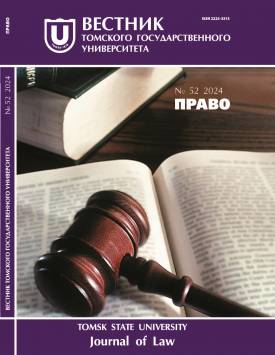On the role of constitutional norms in the formation and development of penal enforcement law
The article considers various aspects of the influence of the norms of the Russian Constitution on the formation and development of penal enforcement law. The author does not support the position that the Constitution is a direct source of law of this branch. At the same time, there are a number of manifestations of the determining role of the Constitution for penal legislation, in addition to the traditionally mentioned in the literature influence of Chapter 2 of the Constitution on the legal status of convicts. This refers to the very name of the criminal-executive law, to the definition of the range of sources of legislation, to the establishment of its correlation with universally recognised international acts. The author considers the prohibition of ‘violence’ contained in the Constitution and the Criminal Executive Code, which equates all violence with torture, as unrealistic and very controversial from the standpoint of international standards. A systemic interpretation of the norms of the Constitution and universally recognised international acts does not allow to regard the compulsory labour contained in the Code for the majority of prisoners sentenced to imprisonment as a violation of the constitutional prohibition of forced labour. This should be reflected in the norms of the General Part of the Penal Enforcement Code of the Russian Federation. Taking into account the amendments to the Constitution of Russia adopted in 2020, it is advisable to adapt to modern conditions the previously successful experience of involving representatives of civil society in the implementation of penal enforcement policy. The content of Article 9 of the Code on the concept of correction of convicted persons should also be clarified in the direction of greater compliance of its content with the traditional values of Russian society. In our opinion, it makes sense to specify it: "Correction of convicts is the formation of their readiness and ability to consciously comply with the requirements of the criminal law in the spirit of respect for man, society, the state and the basic traditional moral values of Russian society". The latter are formulated in Article 5 of the Decree of the President of the Russian Federation dated 9 November 2022. No. 809 "On Approval of the Principles of State Policy for the Preservation and Strengthening of Traditional Russian Spiritual and Moral Values": life, dignity, human rights and freedoms, patriotism, citizenship, service to the Fatherland and responsibility for its fate, high moral ideals, strong family, creative labour, priority of spiritual over material, humanism, mercy, justice, collectivism, mutual assistance and mutual respect, historical memory and continuity of generations, unity of the peoples of Russia. The author declares no conflicts of interests.
Keywords
constitutional bases of penal enforcement legislation, the Constitution of the Russian Federation and penal enforcement lawAuthors
| Name | Organization | |
| Utkin Andrey V. | Tomsk State University | andrey.utkin13@gmail.com |
References

On the role of constitutional norms in the formation and development of penal enforcement law | Tomsk State University Journal of Law. 2024. № 52. DOI: 10.17223/22253513/52/5
